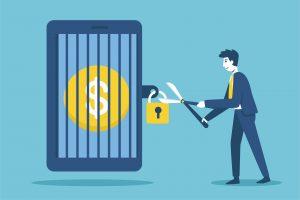Death always comes wrapped with pain. It shatters the world of the deceased’s loved ones. They also need to take care of some legal things and assets with emotional trauma. In this digital world, digital assets are also there, along with physical ones. So, taking care of those pass on digital assets also becomes your responsibility.
Cryptocurrency investment is quite common among people these days. But many investors don’t take this fun money seriously enough, ignoring what happens to crypto when you die.
These crypto accounts are different from traditional investment accounts. Crypto represents the digital currency, which also comes under your digital assets. But the difference lies in the security factors. Statistics say that around 10% of the bitcoin circulating in the market eventually gets lost. One of the reasons is assumed as the lack of concern regarding cryptos after their death.
According to a 2020 poll by the Cremation Institute, an online provider of funeral planning services, around 85% of cryptocurrency investors are unsure how to use cryptocurrency in their estate planning. To save your cryptos even after your death, here are some factors that you can do to take care of your cryptos.
The security trade-off and importance of choosing the right person
When planning for your crypto assets, you must first think of a person to whom your assets will go in your absence, like a beneficiary. A beneficiary is an individual or group you want to receive an asset upon death. Know your cryptocurrency assets in your estate plan, including their storage location and intended recipients.
It is essential to decide who to notify about your crypto assets before you start worrying about how to safeguard them most effectively. For the person you notify to be able to access your cryptocurrency-based funds, they also need to be computer knowledgeable.
The user will have to hire someone to help them if they don’t know how to use a hardware wallet or an exchange, or they will have to learn how to utilize crypto legacy platforms and devices on their own. It poses a security threat since it is relatively straightforward for the cryptocurrency to get transferred to the wrong user, lock oneself out of devices, or withdraw money using the incorrect token specifications.
Another thing to consider here is how much information you should reveal. You must provide sufficient details for someone to be able to access your cryptocurrency assets. But should you entrust that knowledge to just one individual, or should you distribute the instructions among a few reliable acquaintances? You alone have the solution, yet you must still think about it.
So, while choosing beneficiaries, consider the factors listed below:
- Family: Taking care of your family, especially your spouse and small children, and providing for their necessities.
- Other Family: If you’ve been supporting your parents or siblings and wish to keep doing so.
- Friends: You might desire to assist a buddy with upcoming difficulties if you assisted them with their cash through difficult times.
- Age: Certain investing firms have limitations for minors (under age 18). Make your trust the beneficiary if you can. The sub-trust for a minor can then be retained until the minor becomes 18 or reaches another age that you specify in the trust.
- Finance Manager: Designate a trustee to manage the money needed for a needy person’s living needs. It is perfect for a young adult or a spendthrift youngster who is incapable of managing their finances.
- Alternates: If the primary beneficiary dies before the money is distributed, choose a backup beneficiary. By designating a backup, probate can be avoided.
- Multiple beneficiaries: Your spouse, children, parents, siblings, other family members, friends, businesses, or nonprofit organizations can all be your beneficiaries.
You can think of a digital will to pass on all this information to your beneficiary. Talking about digital will is not similar to something created online or electronically. A digital will can be attached to your traditional will or can be a separate document. It deals with your entire pass on digital assets and property.
You must choose an executor in your crypto will, responsible for carrying out your testament and naming beneficiaries for your cryptocurrency holdings. Another option is to appoint a separate digital executor responsible for safeguarding and maintaining your digital property and assets. Consider appointing a crypto-savvy or digital executor to simplify the process for all parties.
What steps all crypto users should take?
After choosing the person for your beneficiary, you must do the following actions. To keep your crypto assets even after your death, follow the given steps:
- Location of your assets
The location of any of your hardware wallets or hot wallets where your cryptocurrency is kept should be included in your instructions. Now may be an excellent moment to combine your assets if you have them spread across several locations, such as DeFi pools, controlled exchanges, or non-fungible token marketplaces.
In case you have a software wallet, your executor or beneficiaries can get in touch with cryptocurrency exchanges like Coinbase, Gemini, or eToro directly to arrange the transfer of your assets if your crypto legacy is kept in a custodial account there. They will want your death certificate, probate papers (such as a copy of your will), identity documentation, and a letter from the executor specifying what to do with the cryptocurrency in the account to begin this procedure.
Posthumous access to your cryptocurrency will rely on how effectively you have documented your assets if it is kept offline in a cold wallet. This physical storage device resembles a USB drive. It’s up to you where you eventually keep this data. You may think about storing it in a safe deposit box, including it in your estate plan, or giving it to a lawyer, member of your family, or a friend.
- Keep your Passwords, private keys, and backup codes safe.
Make a list of all the passwords, private keys, and seed phrases the beneficiaries will require to access your cryptocurrency wallets, email addresses, and exchange accounts. Your crypto wallet’s private and public keys are necessary to access your crypto assets. Let us explain public and private keys if you’re about to dip your toe in cryptocurrency.
When sending bitcoin into a wallet, the public key is utilized. One must employ the private key to validate transactions and demonstrate control over a blockchain address. A private key is necessary to “unlock” a transaction, such as receiving one bitcoin (BTC) and proving that you are the rightful owner and earner of that bitcoin for your pass on crypto legacy.
Consider your public key to be your email address. It is publicly available so anybody may send items—in this example, cryptocurrency—to that address. Similar to how you may tell anyone your routing number and bank account number to set up a direct deposit, that information prevents them from making withdrawals or accessing your account in any other way.
On the other hand, the wallet owner has access to the private key. Your crypto wallet’s private key is a password and must be kept confidential. You must be aware that anyone who finds your private key will have access to all the cryptocurrency in that wallet and will be free to do anything they want.
Many wallets employ a “seed word” to open your wallet, commonly referred to as a “secret recovery phrase.” You will receive a set of alphanumeric characters when you open a cryptocurrency wallet using MetaMask, which you may use to access your funds. Behind this excellent string of words is the program that has your private key.
If two-factor authentication is enabled, you’ll also need to provide the location and password for the device where the app is stored. You must also give the location information and password for your current mobile device if your digital accounts are set up to receive SMS security notifications.
- Get Technical advice
It’s better to specify the number and details of the beneficiaries who will handle your crypto assets in your absence. You can also include some basic steps for the beneficiaries of your digital pass on will. For instance, you may describe the ideal exchange to utilize or provide a quick explanation of how they can create their wallet and move money. The fact that platforms might appear and go over time is something to consider. Additionally, security flaws can make you move money to new wallets. It implies that you must keep your instructions up-to-date.
How to copy down your sensitive crypto information?
After you are done with the steps and secure your descendants’ crypto assets, you should now think of how you can transfer the details to your beneficiaries. As mentioned earlier, your private and public keys are the only access to your crypto assets. So, any mistake while transferring can make you lose your assets for a lifetime.
It’s not the best idea to deliver information by email or to write seed phrases on post-it notes and tape them to the fridge. In a perfect world, you would write down the information on paper and create many copies. The copies of your pass on crypto legacy should then be kept in more than one place to avoid creating a single point of failure.
Consider the scenario where your house caught fire, and you had just one paper copy on your nightstand. The money would never be available to your recipient. Some firms offer seed phrases and password storage on metal plates so that you may increase the protection of your critical cryptographic data. It offers further defense against things like water damage, home fires, and the majority of other possible threats to a paper copy.
Another thing to note is that the list of your cryptocurrency information shouldn’t be included in your will. After your death, all information in your pass on will, including any cryptographic passwords, becomes legally accessible to the public.
Conclusion
So, now you know what happens to crypto when you die and how to keep your crypto assets safe even after death. Your crypto wallets are secure and the best option to store your assets, but only when you’re alive. These crypto wallets don’t give access to anyone other than you because of their security policies.
But now, you can be at peace of mind by doing the following steps mentioned above and making a digital will. Your loved ones will also face fewer burdens for the digital will. It will make the process and situation a bit easier for them.
Having a crypto will is the safest option of all. You can have your digital estate plan that covers all your crypto assets for your descendants after your death. The sooner, the better.






